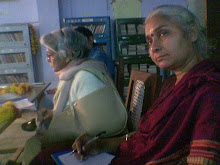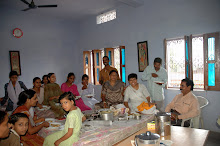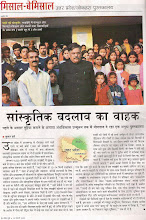The year 2005 proved to be an year of creativity and reiteration of the commitment to the cause of marginalised and under prieveledged sections of the society.The Library organised such activities through out the year which helped it reach vulnerable groups like children,women dalits and backwards.
National School Of Drama, New Delhi organised a month long production cum training theatre workshop for the young girls and boys from 20th May 2004 to 18th June 2004. The participants in this camp were from Azamgarh, Mau ,Ghazipur and Sultanpur districts.Expert trainers from NSD exposed the young participants to a new horizon of creativity.The participants prepared two plays and 7 shows were organised in the library and adjoining villages. North Central Zone Cultural Centre, Allahabad ,organised a theatre training workshop at the library in which again trainees from adjoining districts participated .Ministry Of Culture gave a grant of Rs 50,000/ for the production of the play Andha Yug written by Dharm Veer Bharti.This was rehearsed in the month of June and final production was staged on 9th of July 2005 in the presence of Sri Devendra Raj Ankur Director National School OF Drama, New Delhi and writers like Sri Namwar Singh, Kamla Prasad , Parmanad Srivastava.Theatre had been a continuous activity during the year.
This year the Library achieved another milestone.Ms Shabana Azmi inaugerated a new block on March 2 ,2005.This block which is named after the noted Urdu poet Kaifi Azmi has been built by the funds provided by Ms Shabana Azmi. Sri Kuldip Nayer and Sri Shahid Siddiqi , Members of the Parliament through their MPLAD scheme.On this occasion noted social activist Ms Teesta Setalwad was also present.
CAPART sanctioned a income generation programme of honey-bee keeping 50 marginalised farmers, mostly from dalits and backward communities, were identified and were trained by experts.These benificiaries were given honey-bee boxes with colonies at subsidised rates.The programme was successfully organised and post- completion evaluation found that the beneficiaries could add extra monthly income of Rs 700 to 1000 p.m.
The Library launched a very ambitious project of sensitizing local men and women on gender issues with the financial support of OXFAM ,an international donor agency.A detailed area profile has been prepared for 10 villages which have been identified on the basis of social and economic backwardness .A group of four boys and girls had been exposed to various gender issues by sending them to various symposia, discussions, training interventions and on the ground programmes.This group is performing the role of catalyst and sensitising villagers against gender related violence.Also efforts are on to form minimum three self help groups of women.NABARD has shown keenness to organise training inputs to help capacity building.
In the year 2006¸ 1174 new books were added in the library. With the help of Nehru Yuvak Kendra, Azamgarh a village youth club has been established.More game facilities have been added to the existing one.
This year the library has got the cooperation of two senior level retired Govrnment doctors namel Dr Raja Ram and Dr R.A.Mishra who visit the library every second month in rotation.With their help Library has been able to organise free medical camps every month.
To generate awareness among the villagers programmes of national importance like tree plantation, cleanliness and immunisation were organised throghout the year. The computer centre and sewing training facilities were further strengthened and new machines were added .To highlight the importance of water conservation the Library had undertaken a big project of constructing a huge water reservoir with the help of local Block and more than 50% work was completed this year.
Click Here!
sri ramanand saraswati pustkalaya
Subscribe to:
Post Comments (Atom)
Women dare to ask question:
The mundane and routine life of Prabhawati had always been on the receiving end. Poverty, ill treatment of in laws and regular beating by a drunkard husband Bhagwat were all she could remember till she met Kusum and Pushpa, two activists on gender issues. SRSP, with support of OXFAM, has initiated a campaign against gender violence in fifteen surrounding villages. Prabhawati's village Sahnupur is one among these. She learnt the art of protest during interaction with Kusum and Pushpa and that was the beginning of the end of accepting cruelty without asking questions. "How dare you ask question" was the reaction of Bhagwat, with a sense of disbelief on his face, one day when he slapped her and a defiant Prabhawati asked uncomfortable questions. Since then Prabhawati never looked back. She giggles while narrating, before women participants in a discourse on gender, how she reacts to the violent behaviour of her husband and how much he fears raising his hands on her because he knows that she will pay him back in the same coins. Prabhawati is one of many women of different age groups who regularly attend various capacity building programmes and discussions organised by SRSP. These exposures have taught them to ask questions and not to accept violence against them in different forms and at various levels.
Letters from a Goa prisoner to writers: Sumant Bhattacharya in Indian Express of 18 th January 1998
NEW DELHI, January 17: From his tiny cell in Goa's Central Jail, Sudhir Sharma, Inmate No 797, has been fighting a long and lonely battle: he wants to read. The Constitution and the Supreme Court say he has the right to do so, his prison authorities say no.Sharma, a former addict, was arrested in 1993 and sentenced to a 10-year jail term under the Narcotics Act. While in prison, one day, a fellow inmate showed him a copy of Pahal, a monthly Hindi literary magazine. It was this that, Sharma says, gave him a reason to live.
He wrote to Pahal editor, noted Hindi writer Gyanranjan, who sent him his books. They reached the jail but authorities said he couldn't read them. The books were sent back and Sharma was moved to a sub-jail, in Vasco, where, he says, the conditions are worse.
Still, he keeps writing letters, to Gyanranjan, Hindi novelist and DIG of Border Security Force, Vibhuti Narain Rai; authors Nirmal Varma, S R Yatri and Asghar Wajahat. These letters aren't sent through ``official channels'', he smuggles them out, sometimes through an inmate on his way to the hospital, a friendly warden or an inmate's relative. In his latest letter to Rai on December 10, 1997, Sharma says he's perhaps paying for raising his voice.
The story of his life, as told through his letters: Once a student of Delhi University, Sharma left home for Mumbai. He began working for the underworld don Karim Lala's nephew Samad Khan, fell in love with a ``penfriend'' from Jodhpur. Things changed when Samad Khan was killed and his girlfriend ditched him. Sharma became an addict and began to peddle drugs until he landed in jail.
He clocked his days in despair until he read Pahal. ``Pahal ke ank ne meri zindagi mein pranvayu ka sanchar kiya,'' he writes in a letter to Rai. (Just one issue of Pahal gave me a fresh lease of life). He goes on to thank Gyanda (Gyanranjan) for accepting a prisoner as a reader. ``Thank you for agreeing to share your books with a criminal. I know I have done something wrong but I am conscious. Don't I have the right,'' he asks, ``to know what's going on, to be sensitive?''
Books and magazines came pouring in which jail authorities confiscated. He also wrote to Kiran Bedi. In a letter, he says he believes that his persecution by the jailer was largely due to his attempt to spill the beans in the letter to Bedi.
The IG (Prison), Goa, and the superintendent of the Central Jail in Aguada, quoted the jail manual to justify their action. In a letter to Rai dated July 8, 1996, the superintendent says:
"In view of Rule 17 of the Goa Daman and Diu Prisons (Facilities to the prisoners) Rules 1968, the parcel which was sent by you was refused by this jail."
According to this rule, prisoners' mail, both incoming and outgoing, "shall be carefully censored." And a prisoner may be asked to give "a list of persons with whom he is likely to correspond during his period of imprisonment. As far as practicable, this list shall be scrutinised."
Jail authorities claim that since these authors' names don't figure in this list, he cannot receive anything from them.
This despite a 1979 ruling by a Supreme Court bench comprising Justices V R Krishna Iyer, R S Pathak and O Chinnappa Reddy. The judges had said: "No prisoner can be personally subjected to deprivations not necessitated by the fact of incarceration and the sentence of the court. All other freedoms belong to him, to read and write... to creative comforts... to movement within the prison campus subject to the requirements of discipline and security, to the minimal joy of self-expression, to acquire skills... all other fundamental rights tailored to the limitations of imprisonment."Speaking to The Indian Express, G H Kenaudekar, additional Deputy Collector and Deputy IG (Prison), Goa north, says: "As per rules, books will not be given to prisoners but will be kept with jail authorities." When told of the Supreme Court's ruling, he says that probably the jail administration is not aware of the decision.
Ironically, the books sent to Sharma by Kiran Bedi, who was given the Magsaysay award for reforms in Tihar jail, were also returned. Says Bedi: "The Goa jail administration has overlooked the verdict and directions of the Supreme Court. It should be brought to book for this." Until that happens, Inmate No 797 will keep waiting -- and writing.















.jpg)













1 comment:
bahut bahut badhaie blog banane ka,kisi bhi mission ko pura karne ke liye kaie imaandar haath chahiye,jo SUDHEER SHARMA aur PADMA RAI ke roop me,aur kaie haath jo team ke roop me karyarat hain. mai un sabhi ko dhanyavad deti hoon woh sabhi prashansa ke bhageedar hain.meri shubkamna yeh apne mission ko pahuche aur mera haath SRSP ke saath hai.
Post a Comment